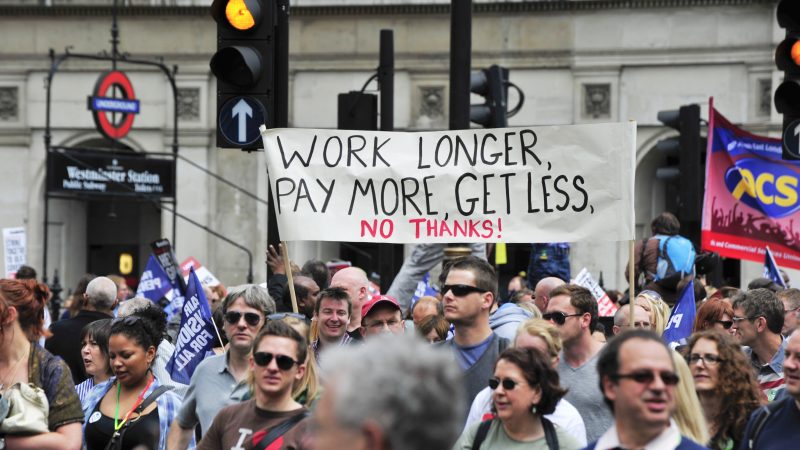
Our trade union movement is being renewed before our eyes. We are witnessing the biggest and most varied and diverse wave of strike action for a generation. Working people from all different sectors of the economy, in both the private and the public sector, are standing up for themselves and standing together with their work colleagues. As well as demanding decent pay as the cost of living soars, their actions raise questions about the direction of our economy and the lack of fairness in the current world of work.
This solidarity in action has the potential to transform our labour movement and our society for the better. There is hope because of the diversity of those taking action and because of an empowered and united trade union movement. We need positive political change to address the currently dysfunctional world of work.
Those taking action in the last few months – workers with their babies in slings, workers pushing prams on the demonstrations, young (and older) workers singing and having fun on the picket lines, migrant workers, workers with disabilities, LGBT+ workers, workers from BME communities – show the diversity of our modern working class. And the public support for the strikes from those who are not taking action but identify with the strikers’ demands further shows how modern trade unionism has come of age.
The demands of our renewed movement are better pay but also terms and conditions that meet the aspirations of the contemporary world of work. Key demands advanced are proper work/life balance and flexibility for caring responsibilities at a time of work intensification, as well as job security, rates of pay that meet the cost of living and health and safety. In a wide variety of sectors, from the postal service to higher education, working people are resisting gigification and casualisation.
Public service workers in health, education and the civil service and those delivering key services to the public including transport do not want more privatisation and outsourcing. We do not want cuts in pay and terms and conditions because of a ‘race to the bottom’ that results from outworn economic models. We demand new rights that will change our working lives now and in the future – a new deal for working people.
Amongst the mass strike actions that illustrate the power in organised sectors, we have seen clear gains for union organising in emerging sectors of the economy too. In Coventry, at the Amazon fulfilment site, strikers have declared ‘we are not robots’ and are joining the GMB union in increasing numbers. And workers in the United Tech and Allied Workers section of the CWU and members of the GMB at Apple are taking the fight to the tech giants.
What we need from a Labour government is the right to access and organise workplaces promised in Labour’s new deal for working people. We look forward to the expansion of sectoral collective bargaining though fair pay agreements and the repeal of all undemocratic anti-union laws. The rights in Labour’s new deal will, if implemented, fundamentally change workplaces and give power to individual workers and their organisations, the trade unions, to improve their working lives.
The Tory response to an emboldened and organised working class is (inevitably) new anti-union legislation. Though the strikes (minimum service levels) bill is in essence unworkable, it can be used to frustrate legitimate industrial action. However, the Conservatives cannot bank on the ‘enemy within’ narrative that would have backed the anti-union laws of the past.
The Tory government’s irresponsible reaction to strikes is to sit back and let the CEOs take home inflation-busting pay rises and executives receive large bonuses but block many public sector employers from negotiating in good faith with working people’s demands. The unprecedented wave of strike action and public support shows no sign of abating. This gives the Labour Party the space for a positive stance on workers’ organisation instead of defensiveness. Labour should show we are on the side of those who act to make their workplaces fairer.
The party must centre the demands in Labour’s new deal for working people in our offer to the country at the next general election. Just as we in the trade union movement have seen the resonance that workers’ collective action has had amongst the public, the party will find that supporting transformative change in the world of work will be successful too.




More from LabourList
Turning the page? Labour’s recovery in the polls show a path to 2029 victory
Restoration announce recommendations for NEC candidates
‘Factionalism at the top is weakening Labour – and handing a gift to Reform’